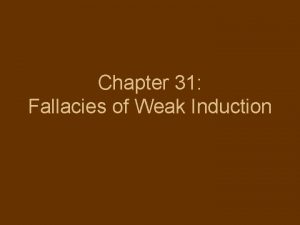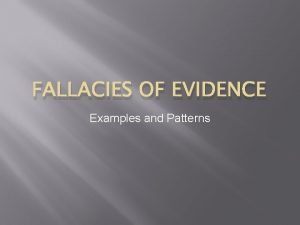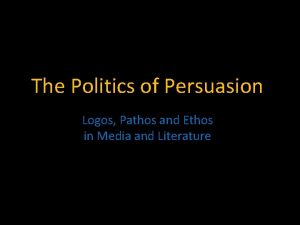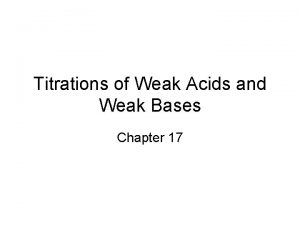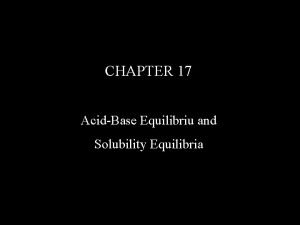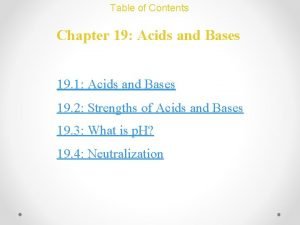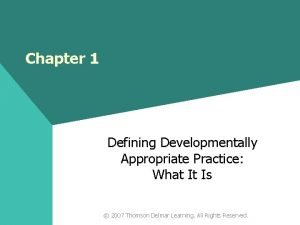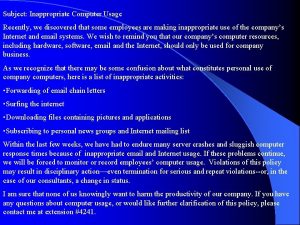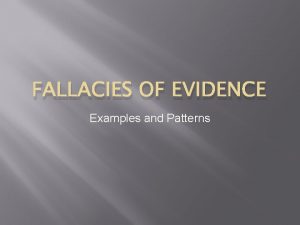Fallacies of Weak Induction Insufficient Evidence Inappropriate Appeal












- Slides: 12

Fallacies of Weak Induction (Insufficient Evidence)

Inappropriate Appeal to Authority • We get a weak Argument from Authority when we cite a source that is: • Not a recognized authority, or a dubious authority • An authority in a field different from the topic of our argument • Potentially biased, untruthful • Making a claim that's controversial in the overall body of authorities.

Appeal to Ignorance • Misplaced Burden of Proof • Arguing that a claim is true just because no one has proven it false (when the burden of proof is actually on the "true" side), or vice versa • Distinguish from the correct argument: Appeal to Testing/Search • "Presumed innocent until proven guilty" is a special legal principle that always forces the burden of proof on the prosecution.

False Alternatives • Any Argument by Elimination (even if it's valid) that has an oversimplified "either-or" premise. • This could be a label for any obvious oversimplification of an issue, or an overly simple answer.

Hasty Generalization • The fallacy of supporting a general conclusion with an insufficient quantity of cases as evidence. Weak inductive generalization • Insufficient evidence in a Hasty Generalization is often called "anecdotal evidence" • Hasty generalization (or over-generality) is usually at the root of stereotyping.

Biased Sampling • Generalizing from a large but biased, unrepresentative, skewed sample. • Generalizing from a poor quality of evidence (even with sufficient quantity), produces a weak argument. • Having a large random sample is the best way to get a good, representative sample.

Weak Analogy • An inductive analogy based on comparing things that have a significant, relevant disanalogy. • "Comparing apples and oranges"

Questionable Cause • Any weak inference from observed patterns to a causeand-effect conclusion, or using a dubious cause-effect claim as a premise. • Includes fallacies of misplaced blame, the "blame game" • Includes oversimplified causal explanations • Includes mistaking correlation for causation • Includes Post Hoc Ergo Propter Hoc

The Slippery Slope Fallacy • A weak inductive prediction of dire consequences • "We shouldn't do A, because that will lead to B, then to C, then D, and D stands for disaster! • The prediction is usually a mere possibility, not a significant probability.

Slippery Slope • BEWARE: Some slopes really are "slippery, " giving us strong inductive prediction. • CONTRAST this fallacy with good argument that we shouldn't do something because doing so will set a precedent that would be very difficult to maintain.

Loaded Question • More of a language issue than a logical fallacy. A question is not an argument. No argument, no fallacy. • A loaded question is a question that carries an assumption(s) that is doubtful and unsupported.

Inconsistency • An argument containing inconsistent premises, or a conclusion that's inconsistent with one or more premise, is a bad argument. Making inconsistent statements is bad outside of an argument, also.
 Fallacy of weak induction
Fallacy of weak induction Inappropriate evidence example
Inappropriate evidence example What is ethos in literature
What is ethos in literature Weak acid strong base titration
Weak acid strong base titration Weak acid and weak base reaction
Weak acid and weak base reaction Strong base strong acid
Strong base strong acid Developmentally appropriate practice definition
Developmentally appropriate practice definition Narrow qrs complex
Narrow qrs complex Inappropriate computer use
Inappropriate computer use Verbal moods
Verbal moods Inappropriate behavior
Inappropriate behavior Fbla professional dress
Fbla professional dress Pictures of inappropriate dress at work
Pictures of inappropriate dress at work
